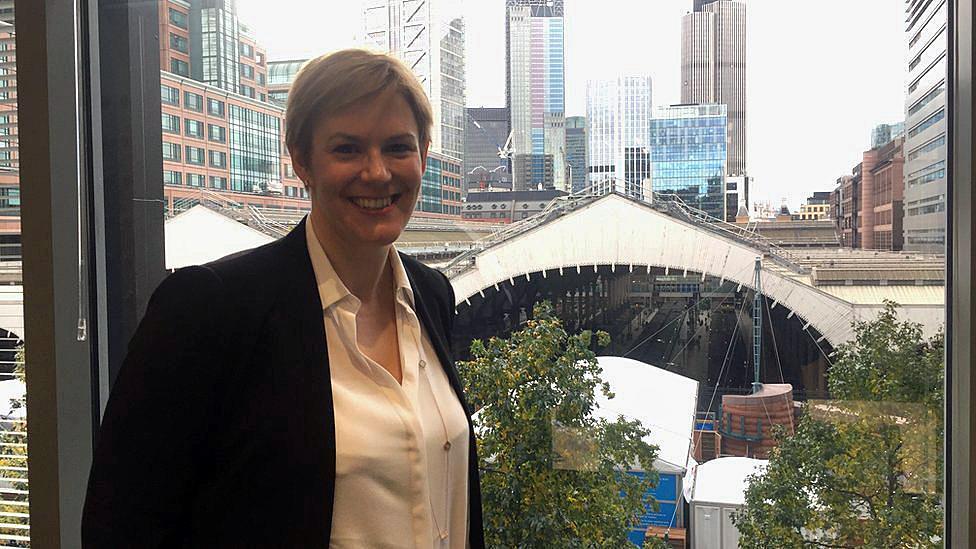Half of us aren't happy to discuss mental health at work
- Published
A construction worker tells BBC Radio 5 live about admitting to his boss that he had PTSD.
Long after Oliver Thompson-Smith's physical injuries had healed, the young man was still suffering.
As a 19-year-old student on a night out in Chester, he had been brutally stabbed and mugged, near his home.
"I couldn't let it go in my head. It was always there," he says. "It started creeping into my nightmares."
He bottled up the fear and trauma for four years, before a suicide attempt prompted him to seek help, perhaps surprisingly, from his manager at work.
But Oliver is by no means typical. Around half of us would not be happy to speak up at work if we had a mental health problem, according to a survey conducted by Comres for BBC Radio 5 live.
The survey asked 1,104 British adults in full-time employment about their attitudes to mental health. And 49% said they would be unlikely to tell their boss about problems such as anxiety, depression or bipolar disorder.
Only 35% said they'd be happy to tell colleagues.
Keeping quiet
Despite his dreadful experience, Oliver is one of the lucky ones. His employer at the time was the construction firm, Laing O'Rourke; he was working on the Crossrail project in London.
His manager was one of the first people he turned to, and because the company has a positive approach to mental health in the workforce, they were able to have a very open and frank conversation.
"He helped point me in the right direction in terms of who to speak to at work, a confidential advice line we have at Laing O'Rourke, who helped me start therapy and has really helped me since then in terms of getting my career on track and do what I can to really help myself," he says.
But according to Sue Baker, director of mental health charity, Time to Change, turning to your boss is not always the best course of action.
"We wouldn't encourage people to routinely disclose," she says. "Because obviously there's really poor practice still.
"It can result in people being passed over for promotion, not being offered opportunities to develop themselves, and to outright discriminatory comments."
She advises people to speak up only if it's clear your employer is supportive of mental health programmes.

Oliver Thompson-Smith was working for Laing O'Rourke on the Liverpool Street for Crossrail project when his mental health problems came to a head
But there are, she says, now more than 500 employers taking positive action, including signing up to the Time To Change pledge, which commits them to address the taboos around mental health.
Ms Baker says about one in six people suffer some kind of mental health problem making it an issue for the entire workforce.
"There are millions of people who are less productive because they are not getting help," she says.
"It costs industry more to ignore mental health and shove it under the carpet than to deal with it."
No Shame
Pizza Hut Restaurants is one of the firms that has signed up to the charity's pledge.
"We have 8,000 people from age 16, to people who've worked for us for 30 years," says the firm's head of communications Gareth Hopley.
"A lot of our managers are 21-year-olds who you're asking to run multimillion pound restaurants.
"The aim is to try to create a culture that says it's ok to put your hand up and say I'm struggling," he says.

Pizza Hut Restaurants is one of about 500 organisations to sign the Time to Change pledge
So when Pizza Hut Restaurants launched a turnaround programme a couple of years ago, a conscious effort was made to focus on improving staff well-being alongside revamping menus and refurbishing restaurants.
The firm has introduced an internal social network called No Shame which encourages discussion of embarrassing topics including mental health, to lessen the stigma around it. Around half of the company's staff use it, says Mr Hopley.
There's also a 24-hour helpline for staff to get advice on anything from anxiety and addictions, to relationships, dieting and fitness.
Mr Hopley believes the business as a whole is benefiting.
"As a business, we want to have a content, happy, engaged workforce, that feels we support them, because then you have a more dedicated, committed team that wants to give a great service to the customers."
BBC Radio 5 live is currently running a year-long State of Mind season, which takes an in-depth look at our mental health.
- Published19 April 2017
- Published12 December 2016
